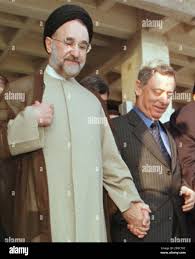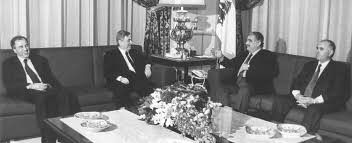Iranian President Mohammad Khatami called for increased cooperation between Islamic and Arab countries to confront Israel, emphasizing their shared interests and the opportunity presented by the challenging situation faced by the Israeli entity. President Khatami received an invitation to visit Damascus from President Hafez al-Assad during his meeting with Syria’s First Vice President, Abdel Halim Khaddam, and Foreign Minister Farooq al-Shara. A joint statement issued in Tehran, Iran’s capital, affirmed Syria and Iran’s unwavering support for the national and Islamic resistance against Israeli occupation.
The statement reiterated the full support of Syria and Iran for Lebanon’s stance, which demands Israel’s immediate and unconditional withdrawal from southern Lebanon. Damascus and Tehran denounced the Israeli proposal as a “conspiracy” designed to deceive international public opinion, sow confusion in Lebanon, and create discord with Syria. The statement also urged Turkey to reconsider its cooperation with Israel and condemned the Zionist campaigns targeting Iran while calling for relief for the suffering of the Iraqi people. Iran and Syria regarded the Israeli proposal to withdraw from southern Lebanon as a scheme aimed at deceiving international public opinion and creating confusion in Lebanon, thereby harming the shared destiny between Syria and Lebanon.
In a statement issued at the conclusion of the Syrian vice president’s visit to Tehran, which was broadcast by the official Iranian news agency, both countries considered the proposal as a means to undermine the common fate shared by Syria and Lebanon. They reaffirmed their support for Lebanon’s rejection of any conditional Israeli withdrawal and called for an end to the Israeli occupation of all Arab and Islamic territories, particularly Jerusalem. Additionally, they reiterated their support for the Lebanese and Palestinian national and Islamic resistance, recognizing it as a legitimate struggle in accordance with the United Nations Charter.
Tehran and Damascus restated their opposition to any form of military or security cooperation between Israel and Turkey, considering it a threat to all countries in the region.
Syrian Vice President Abdel Halim Khaddam returned to Damascus yesterday after an official visit to Iran. During his visit, he held talks with President Mohammad Khatami and senior officials, where he reiterated Syria and Iran’s support for the national and Islamic resistance against the Israeli occupation. The statement called upon United Nations Secretary-General Kofi Annan to end the Israeli occupation of all Arab and Islamic territories, including Al-Quds Al-Sharif, and to establish security and stability in the region. Syria and Iran regarded the latest Israeli proposal, which entails conditional withdrawal from southern Lebanon, as a conspiracy aimed at misleading global public opinion, inciting strife within Lebanon, and undermining the unified destiny between Syria and Lebanon.
The statement emphasized that both sides firmly supported the national and Islamic resistance against the Israeli occupation, considering it a legitimate right protected by international law principles, the United Nations Charter, and supported by Islamic resolutions. President Khatami highlighted the importance for Islamic and Arab countries to emphasize their commonalities and leverage the challenging situation faced by Israel. He stressed the need for Iran and Syria to cooperate in this direction while strengthening their ties within the framework of the Organization of the Islamic Conference and the United Nations. Vice President Khaddam, who presented an invitation from Syrian President Hafez Al-Assad for the Iranian president to visit Syria, emphasized the necessity for the Islamic world to resolve its issues and avoid divisions.
The television quoted Iranian President Mohammad Khatami as stating during talks in Tehran with Syrian Vice President Abdel Halim Khaddam, “The Arab and Islamic worlds share a unified stance against Israel’s irresponsible policies, and we should utilize this unity to engage in more dialogue.” Khatami further emphasized the potential role of the Organization of the Islamic Conference in facilitating this process. Khaddam, accompanied by Syrian Foreign Minister Farooq al-Shara, also highlighted the importance of enhancing the organization’s role in the Middle East peace process. It is noteworthy that Iran currently chairs the organization’s ongoing session.
Iranian television quoted Khaddam as emphasizing the necessity of strengthening the role of the organization, which is the largest Islamic group, in the negotiation process. He pointed out the potential for achieving positive outcomes under Iran’s presidency. Diplomatic sources noted that Khaddam’s visit to Tehran coincided with a visit by the leader of Hezbollah to the Iranian capital.
The Syrian-Iranian joint statement expressed concern about the military and security cooperation between Turkey and the occupying Zionist entity. They viewed this cooperation as a threat to the national security of countries in the region, especially neighboring nations. The statement called on Turkey to reconsider this collaboration and work towards enhancing and developing regional cooperation among Islamic countries, particularly neighboring states.
Regarding the situation in Iraq, the statement stated that Damascus and Tehran expressed deep concern and regret over the tragedies and challenges faced by the oppressed Iraqi people. They emphasized the need to alleviate the suffering of the Iraqi people and preserve Iraq’s territorial integrity. The statement also condemned the Zionist media campaigns targeting the Islamic Republic of Iran regarding nuclear weapons, which aimed to divert attention from other weapons. Simultaneously, both sides stressed the imperative of establishing the Middle East as a nuclear-free zone and eliminating weapons of mass destruction. They called on the international community to confront these Israeli campaigns and pressure Israel to subject its nuclear facilities to the safeguards system of the International Atomic Energy Agency.



